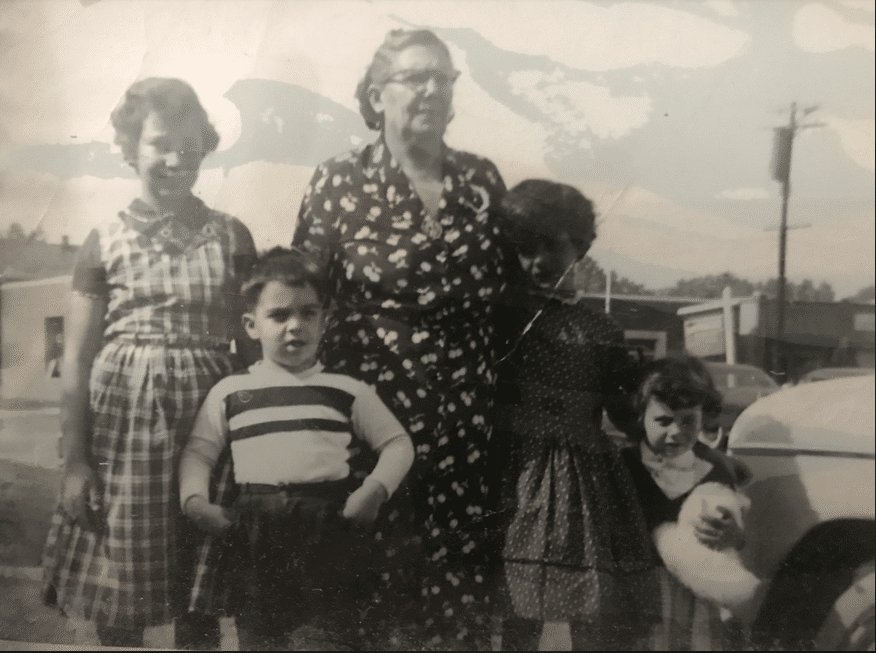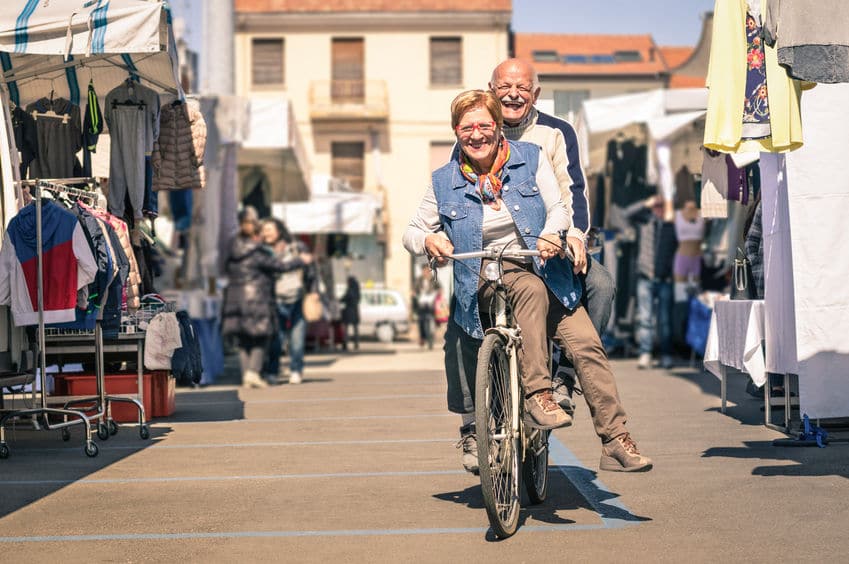by Elaine O’Brien
At a professional fitness conference in the 1980s, I attended a talk by Ken Dychtwald, PhD, author of Age Wave. He warned us that there would soon be a burgeoning wave of people turning 65, and implored the audience to create programs for older people “because THEY would become US.” He lit a fire under me, and this became my life’s work, my meaningful, harmonious passion, a blessing.
I recently addressed the audience at the American Psychological Association (APA)’s Positive Aging: Health and Well-Being Symposium, along with three distinguished professors. I spoke about my PhD study participants, ages 58 to 83, and about applying positive psychology and positive rhythmic movement in a community aerobic dance/fitness program, FitDance, over time. All the study participants attended one-hour classes at least twice weekly for five years or more. These women are vibrant exemplars of positive aging and inspiring role models of wholebeing.
With assistance from researcher Erica Tibbets, PhD, of Smith College, and with input from the their children, we determined that all our participants demonstrated high levels of self-determination, well-being, motivation, enjoyment, and adherence to FitDance. All the women had attended school prior to 1972, when Title IX, a comprehensive federal law, was enacted to prohibit discrimination on the basis of sex in any federally funded education activity. None of them were exposed to sports in school. Now, however, all were active, fit, and lively. They were “older” but not “old.”
In fact, in class one morning, a student (one of four women named Mary in the group) talked about hating the word “old.” Mary is a lively Irish step dancer; to me, she is not old—in fact, she appears almost ageless. Another student, Nikki, posted a story on Facebook about hearing a man tell his son, “Watch out, don’t hit the old lady.” Nikki looked around to see who he was referring to, and realized he was talking about her! He couldn’t have known that Nikki is part of a dance troupe called the Calendar Girls and, not too long ago, danced on an Atlantic City stage with Val from “Dancing with the Stars.”
During that APA presentation, I had a spirited discussion with a dear colleague, Ellen Cole, PhD, coauthor with Jane Giddan of the book 70Candles! Women Thriving in their 8th Decade. When I described a student, Marie, as “older,” she corrected me, saying that Marie was “old.” Marie, known as “Mom Marie” to our class, started attending my program at age 89 and continued until she was 101! A former “Rosie the Riveter” during World War II, she radiated joy, zest, and love. A mover and shaker, she transitioned from dancing to chair dancing as she progressed in age.
For her 100th birthday, Mom Marie’s daughter, “Baby Marie,” held an intimate cocktail and dinner party for her, attended by her colorful, lively older friends. One woman in her 80s, Evelyn, who had served in the Royal Air Force, was shamelessly flirting with my husband, Sean. At one point, after a couple of martinis, Evelyn poked Sean in the arm and asked, “Am I BORING you?” She was bawdy and free-spirited—not reminiscent of my own grandmother’s behavior in her 80s.

Nunni never learned to drive, and lived a simple, contented life as a homemaker. I received lots of care and comfort from her as a child. But my darling Nunni always seemed old to me. It was probably because I was a kid, but it might have been her “house dresses”—the smocks she wore—and the way she carried herself. She never exercised or moved very much, except to walk across the street to get a fresh live chicken, milk, or postage stamps. I revered my Nunni, and even joined the Older Women’s League at 23, because I felt that older people—especially older women—needed to be recognized, elevated, and respected in society.
As we age, there are both gradual and seismic shifts. The losses of people we love are the toughest to bear. When her daughter predeceased her, Mom Marie became “old,” and died shortly thereafter. Prior to that, there was youthfulness in her despite her years. I respectfully disagree with my cherished friend Ellen. Being old is relative. Just because we have a certain number of years behind us does not necessarily make us old.
I like how the French view aging. They say, “J’ai 65 années,” for example: “I have 65 years,” versus, in English, “I am 65 years old.” We may have the years, but does that make us old?
Elaine O’Brien and Lisa Honig Buksbaum offer the workshop “Move2Love, Thriving, and Soaring,” focusing on how appreciative movement can transform lives, at WBI’s Embodied Positive Psychology Summit at Kripalu, May 1–4, 2017.
Elaine O’Brien, PhD, MAPP, CAPP, is a forerunner in the fields of applied positive psychology, Whole Fitness, and positive aging. An internationally acclaimed speaker and author, Elaine has presented at the 2016 American Psychological Association Conference, in Denver, Colorado; the first China Positive Psychology Conference in Beijing; and the Canada and European Positive Psychology Conferences. Elaine is creative director and CEO of Lifestyle Medicine Coaching and Training, LLC, a consultancy, and FitDance: Move2Love training and presentations for whole health and optimal performance. Her doctorate in Kinesiology: Psychology of Human Movement and her Masters of Applied Positive Psychology, from the University of Pennsylvania, align with her background, early vision, and dedication to promoting positive public health, well-being, and social justice for the greater good.


 Elaine O’Brien, PhD, MAPP, CAPP, is a forerunner in the fields of applied positive psychology, Whole Fitness, and positive aging. An internationally acclaimed speaker and author, Elaine has presented at the 2016 American Psychological Association Conference, in Denver, Colorado; the first China Positive Psychology Conference in Beijing; and the Canada and European Positive Psychology Conferences. Elaine is creative director and CEO of Lifestyle Medicine Coaching and Training, LLC, a consultancy, and FitDance: Move2Love training and presentations for whole health and optimal performance. Her doctorate in Kinesiology: Psychology of Human Movement and her Masters of Applied Positive Psychology, from the University of Pennsylvania, align with her background, early vision, and dedication to promoting positive public health, well-being, and social justice for the greater good.
Elaine O’Brien, PhD, MAPP, CAPP, is a forerunner in the fields of applied positive psychology, Whole Fitness, and positive aging. An internationally acclaimed speaker and author, Elaine has presented at the 2016 American Psychological Association Conference, in Denver, Colorado; the first China Positive Psychology Conference in Beijing; and the Canada and European Positive Psychology Conferences. Elaine is creative director and CEO of Lifestyle Medicine Coaching and Training, LLC, a consultancy, and FitDance: Move2Love training and presentations for whole health and optimal performance. Her doctorate in Kinesiology: Psychology of Human Movement and her Masters of Applied Positive Psychology, from the University of Pennsylvania, align with her background, early vision, and dedication to promoting positive public health, well-being, and social justice for the greater good. 







I love this article because I know positive thinking has so much to do with how someone ages!
Dear Susan, Thank you for your kind note. Yes, and beyond positive thinking, our attention, intention, and positive actions really help us to thrive as advance in years. Wishing you every blessing and cheers.
I so appreciate this view of growing older, Elaine. As a society, we need a fresh outlook of what vibrancy and wholebeing looks like in later years. When I taught senior yoga, it was one of the most satisfying, life-affirming classes. From my students, and through your writing, I get a clearer pictures of positive possibilities for our future!
Megan, I completely agree and thanks for your thoughtful, eloquent understanding. We do need a fresh outlook and new language around the possibilities and pro-action our growing older. How wonderful you taught senior yoga; I’d also agree about the blessing and richness of that experience! Grateful for you and your reaching out and sharing.
Well said Elaine. I enjoyed the article very much and thank you for the compliment ☘️☘️
Dear Mary, thank you for your note and inspiration. Not sure how I’m just realizing we are sharing a last name. Happy to know you and dance with lovely you.
I enjoyed your remarks and I totally agree with them. Old but not yet dead.
Thank you Reverend Pat! I appreciate you and am inspired by you, and your commitment to self and other care. What a lovely, wonderful role model and friend you are.
This article certainly resonants with me. Love the difference between “old” and “older” and prefer the French version overall! Our society certainly needs educators like you Elaine to explain the differences and advocate for us. Would be great if schools (all levels) incorporated this discussion and maybe even have a short joint class of both the kids and “us”! Thanks Elaine, you are a blessing to all of us int he class!
Dear Mary, I appreciate your writing, and point of view! You have so much clarity, and a real passion for social justice. Agreed that we need more education, and I’d welcome the chance to create even more opportunities (with you?) to advance adult development and intergenerational learning. Thank you for your passion and inspiration.